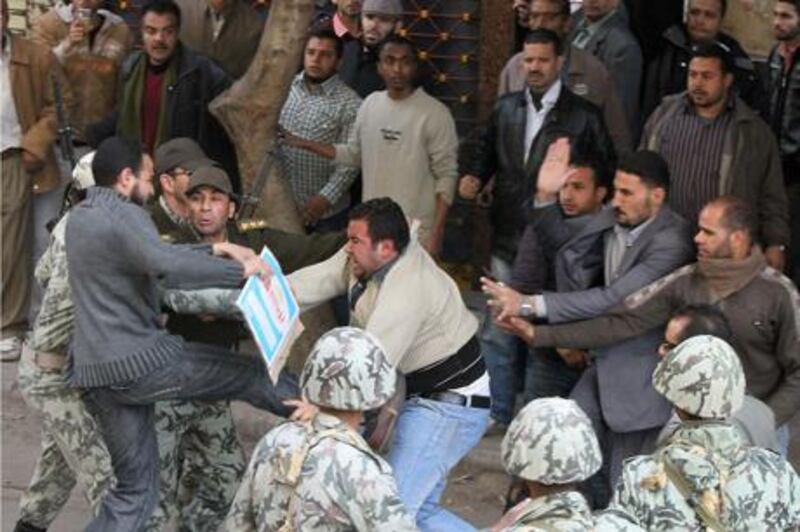CAIRO // A coalition of opposition groups called for a million people to take to Cairo's streets tomorrow to ratchet up pressure for President Hosni Mubarak to leave.
American and other world leaders were also increasing their pressure for an orderly transition to a democratic system.
The coalition of groups, dominated by youth movements but including the outlawed Muslim Brotherhood, said it wants the march from Tahrir, or Liberation Square, to force Mr Mubarak to step down by Friday.
Spokesmen for several of the groups said their representatives were meeting today afternoon to develop a unified strategy for ousting Mr Mubarak. The committee will also discuss whether the Nobel Peace laureate Mohammed ElBaradei will be named as a spokesman for the protesters, they said. Mr ElBaradei, a pro-democracy advocate and former head of the UN nuclear watchdog, invigorated anti-Mubarak feeling with his return to Egypt last year.
The Muslim Brotherhood said it would not take a leadership role. Western governments and many secular Egyptians have expressed fears about a significant Brotherhood role in Egyptian politics. "We don't want to harm this revolution," said Mohamed Mahdi Akef, a former leader of the Brotherhood.
The groups also called for a general strike today, although much of Cairo remained shut down, with government officers and private businesses closed.
Israa Abdel-Fattah, one of the protest organizers and one of the founders of April 6 group, a grassroots movement of young people that has been pushing for democratic reform since 2008, said: "We don't want life to go back to normal until Mubarak leaves. We want people to stay away from their jobs until he leaves."
Banks, schools and the stock market were shut for the second working day. Long lines formed outside bakeries as people tried to replenish their stores of bread, the main source of sustenance for most Egyptians.
Barbed wire sealed off the main road to Tahrir Square, a city centre plaza that demonstrators have occupied since Friday, turning it into the national focal point of calls for the ousting of Mr Mubarak, whom they blame for widespread poverty, inflation and official indifference and brutality during his 30 years in power.
Thousands of people had gathered into the square by early morning. Many slept sprawled on the grass or in colourful tents. Others were filtering into the square in the early morning.
Police and garbage collectors appeared on the streets of Cairo and subway stations reopened after soldiers and neighbourhood watch groups armed with clubs and machetes kept the peace in many districts overnight.
One group fended off a band of robbers who tried to break in and steal antiquities from the warehouse of the famed Karnak Temple on the east bank of the Nile in the ancient southern city of Luxor.
The locals clashed with the attackers who arrived at the temple carrying guns and knives in two cars around 3am, and arrested five of them, said a neighbourhood protection committee member, Ezz el Shafei.
The locals handed the five men to the army, which has posted a handful of soldiers at the vast temple's entrance.
Some 30 to 40 representatives of groups that have protested against Mr Mubarak were meeting to discuss their strategy and plan the post-Mubarak era, said Abouel Elaa Maadi, a representative of al-Wasat, a moderate breakaway faction of the Muslim Brotherhood.
The meeting excluded the legal opposition parties that had been allowed to operate under Mr Mubarak, Maadi said.
A leading Muslim Brotherhood official told The Associated Press that his group has not decided whom to back as head of the committee, but if the members agree on naming Mr ElBaradei as the head of the committee, "this is fine."
"We didn't deputise anybody because we don't want anybody to be solely in charge," Saad el-Katatni said.
The outlawed Muslim Brotherhood is Egypt's largest opposition movement.
Its support base comes in large part from its elaborate network of social, medical and education services. It made a suprisingly strong showing in parliamentary elections in 2005, winning 20 per cent of the legislature's seats, but it failed to win a single seat in elections held late last year and are widely throught to have been rigged in favour of Mr Mubarak's ruling party.
Mr Mubarak, a former air force commander in office since 1981, is known to have zero tolerance for Islamists in politics, whether they are militants or moderates, and it remains highly unlikely that he would allow his government to engage in any dialogue with the Brotherhood.





